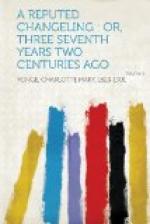WORDSWORTH.
Time wore away, and the Lent Assizes at Winchester had come. Sir Philip had procured the best legal assistance for his nephew, but in criminal cases, though the prisoner was allowed the advice of counsel, the onus of defence rested upon himself. To poor Anne’s dismay, a subpoena was sent to her, as well as to her uncle, to attend as a witness at the trial. Sir Philip was too anxious to endure to remain at a distance from Winchester, and they travelled in his coach, Sir Edmund Nutley escorting them on horseback, while Lucy was left with her mother, both still in blissful ignorance. They took rooms at the George Inn. That night was a strange and grievous one to Anne, trying hard to sleep so as to be physically capable of composure and presence of mind, yet continually wakened by ghastly dreams, and then recollecting that the sense of something terrible was by no means all a dream.
Very white, very silent, but very composed, she came to the sitting-room, and was constrained by her uncle and Sir Philip to eat, much as it went against her. On this morning Sir Philip had dropped his sternness towards her, and finding a moment when his son-in-law was absent, he said, “Child, I know that this is wellnigh, nay, quite as hard for you as for me. I can only say, Let no earthly regards hold you back from whatever is your duty to God and man. Speak the truth whatever betide, and leave the rest to the God of truth. God bless you, however it may be;” and he kissed her brow.
The intelligence that the trial was coming on was brought by Sedley’s counsel, Mr. Simon Harcourt. They set forth for the County Hall up the sharply-rising street, thronged with people, who growled and murmured at the murderer savagely, Sir Philip, under the care of his son-in-law, and Anne with her uncle. Mr. Harcourt was very hopeful; he said the case for the prosecution had not a leg to stand on, and that the prisoner himself was so intelligent, and had so readily understood the line of defence to take, that he ought to have been a lawyer. There would be no fear except that it might be made a party case, and no stone was likely to be left unturned against a gentleman of good loyal family. Moreover Mr. William Cowper, whom Robert Oakshott, or rather his wife, had engaged at great expense for the prosecution, was one of the most rising of barristers, noted for his persuasive eloquence, and unfortunately Mr. Harcourt had not the right of reply.
The melancholy party were conducted into court, Sir Philip and Sir Edmund to the seats disposed of by the sheriff, beside the judge, strangely enough only divided by him from Major Oakshott. The judge was Mr. Baron Hatsel, a somewhat weak-looking man, in spite of his red robes and flowing wig, as he sat under his canopy beneath King Arthur’s Round Table. Sedley, perhaps a little thinner since his imprisonment, but with the purple red on his face, and his prominent eyes so hard and bold that it was galling to know that this was really the confidence of innocence.




